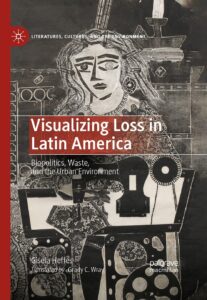By Gisela Heffes. Palgrave, 2023.
Visualizing Loss in Latin America engages with a varied corpus of textual, visual, and cultural material with specific intersections with the natural world, arguing that Latin American literary and cultural production goes beyond ecocriticism as a theoretical framework of analysis. Gisela Heffes poses the following crucial question: How do we construct a conceptual theoretical apparatus to address issues of value, meaning, tradition, perspective, and language, that contributes substantially to environmental thinking, and that is part and parcel of Latin America? The book draws attention to ecological inequality and establishes a biopolitical, ethics-based reading of Latin American art, film, and literature that operates at the intersection of the built environment and urban settings. Heffes suggests that the aesthetic praxis that emerges in/from Latin America is permeated with a rhetoric of waste—a significant trait that overwhelmingly defines it.
Gisela Heffes is a writer and Professor of Latin American Literature and Culture at Rice University. Her most recent publications are the co-edited volumes The Latin American Ecocultural Reader (2020), Pushing Past the Human in Latin American Cinema (2021), Un gabinete para el futuro (2022), and Turbar la quietud (2023). She is the author of Visualizing Loss in Latin America: Biopolitics, Waste, and the Urban Environment (2023), the novel Cocodrilos en la noche (2020; 2023); the poetry collection El cero móvil de su boca /The Mobile Zero of Its Mouth (2020; forthcoming in Swedish as Munnens rörliga nolla, 2023); the hybrid collection Aquí no hubo ni una estrella (2023) and of Ischia (2000; English edition, 2023).
Endorsements for Visualizing Loss in Latin America
“Gisela Heffes leads us through the wastescapes of Latin America, traveling among the ruins of capitalism embedded into the bodies and ecologies of humans and non-humans. The result is a masterpiece that trespasses disciplines and geographies to speak of the planetary wasting of subaltern lives.”
—Marco Armiero, ICREA Research Professor, Universitat Autonoma de Barcelona, Spain, author of Wasteocene. Stories from the Global Dump (2021).
“A long-time awaited translation, and expansion, of a seminal book on the environmental humanities of Latin America. Back then, Heffes mapped the emergence of a field. In this expanded version, she gives an account of its evolution in the last ten years. The book is a comprehensive approach to aesthetics in Latin America as it relates to a topic still elusive, despite its exponential growth: waste and the Latin American city. One claim stands out particularly: the environmentalist practices of conservation, preservation, and recycling in Latin America are carried out by humans that, paradoxically, are themselves subsumed in a rhetoric of waste. This book is an indispensable reference for those who are willing to expand their coverage of perceptions, values, beliefs, and the place of aesthetics within Latin American cultural figurations.”
—Jorge Marcone, Associate Dean of Humanities – Professor of Spanish and Portuguese/Comparative Literature, Rutgers University
“Gisela Heffes’s work has been paramount in building bridges between ecocriticism and literary, artistic and scholarly responses to the rise of neo-extractivism, which rethink the agency of more-than-human existents and environmental justice. As the modern world-system’s first colonial margin, the region is host to a rich aesthetic and political archive of mourning and resurgence; Visualizing Loss in Latin America mobilizes it masterfully for a bio-ecocritical re-assessment of our planetary present.”
—Jens Andermann, Professor of Spanish and Portuguese, New York University, and author of Entranced Earth: Art, Extractivism, and the End of Landscape (2023)
